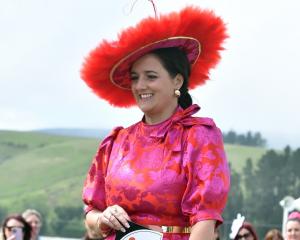


It's very silly and it feels like fun.
On the catwalk and on the street this European summer, a new generation has revived the 1950s, ’80s and ’00s puffball.
With its rounded shape and short length, it is a silhouette made for parties rather than professionalism. Dazed magazine declared earlier this month that ‘‘the bratty, indie sleaze-era bubble skirt is this summer’s biggest trend’’.
Depop, the resale app, reports that searches are up 226% on the platform since the start of last year. They can be found on the catwalk (Miu Miu, Aaron Esh, Nicklas Skovgaard) and on the high street (Asos, Weekday, New Look).
The bubble skirt’s rise has also been helped by its wearers - celebrities such as Sabrina Carpenter and Olivia Dean, as well as fashionable 20-somethings in enclaves including east London’s Dalston.
Cristobal Balenciaga and Pierre Cardin first introduced bubble silhouettes in the 1950s, when fashion was focused on volume.
If some associate it with the indie sleaze era of the 2000s - see Amy Winehouse at the Brit awards in 2007 - the ’80s is a reference currently evoked by designers working with the silhouette. This is the decade where the puffball became fashionable thanks to designers like Christian Lacroix and celebrities including Diana, Princess of Wales and Paula Yates.
Skovgaard, known for his bubble skirts, recently showed his spring-summer 2025 collection at Copenhagen fashion week partly inspired by ’80s aerobic looks. It featured various takes on the bubble skirt.
‘‘As a child of the early ’90s I’ve seen a lot of images of my mother in her youth from the ’80s wearing bubble skirts and dresses, so it’s also been an association within the past years to the style of the ’80s,’’ he says.
Skovgaard says the bubble skirt is a signature of his brand, but it is within the past six months that he has noticed their popularity has increased.
‘‘It’s so nice to see people in the street wearing them. I also love when you can spot someone who has dug out an old bubble skirt from their mother’s closet and given it a new life.’’
London fashion week designer Aaron Esh created bubble skirts for his spring collection too. First inspired by his girlfriend’s vintage skirt, he says the silhouette is ‘‘very ’80s and silly almost. I’m not sure that’s the right word but it’s not proper and I think, for that, it feels quite fun.’’
Esh updated the design by combining it with ‘‘fabrics that are more traditionally less fun, like grey tailoring or a tweed’’.
Eni Subair, fashion features director at the Face, says that even if lots of bubble skirt wearers can’t afford high prices, designs like Esh’s are essential to the trend spreading.
‘‘When you see a younger designer tackle that silhouette in a really cool way, it gives you something to play with and something to aspire to.’’
Crucially, she adds, the bubble is a silhouette that feels inclusive, and irresistible whatever someone’s personal style.
‘‘It’s very versatile and anyone can wear it.’’
The volume also adds another factor, she says.
‘‘I don’t feel as self-conscious as I do when I’m wearing a pleated miniskirt or something.’’
Depop argues that the bubble skirt has appeal that goes beyond its party-ready spirit.
‘‘They’re such a versatile piece which can easily be dressed up or down,’’ says a spokesperson for the app.
‘‘The skirt creates a unique silhouette, making it a popular choice among Gen Z and millennials who use fashion as a form of self-expression.’’
But is the bubble skirt something of a bubble - one that will burst after the summer?
Subair says it ‘‘will still be there on the street style circuit, because it’s such an interesting piece’’, but Esh is moving on.
‘‘When you see it on the high street you know it’s mainstream,’’ he says.
The bubble skirt will be nowhere to be seen in his next show in September.
- Guardian News and Media












